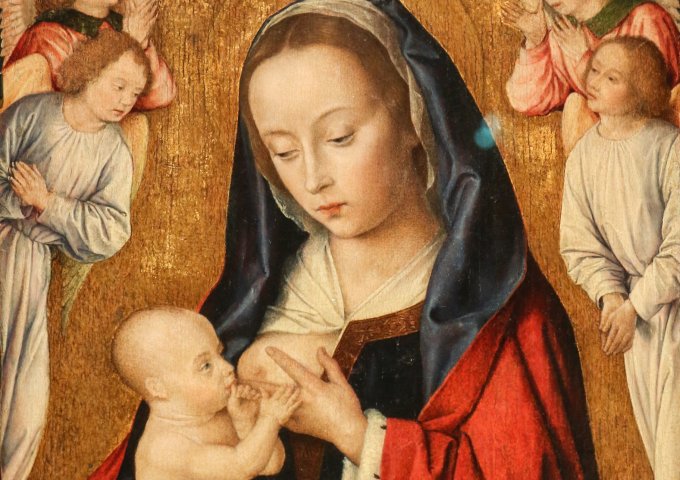Dulcedo

DAY 4: DULCEDO
While on pilgrimage to the Marian Shrine of Europe recently, I observed that many people seemed to rely on artificial sweeteners such as Splenda, Stevia, and Saccharine. And even if they reached for something more natural, sugar would be the usual sweetener we go for. But cane sugar was an exotic import to Europe; the Crusaders called it "sweet salt" and it only appeared as a sweetener in Europe from about the 12th-century. So, when the 'Salve Regina' was being written at least a century before the advent of sugar, the most common form of sweetener known to the Europeans and moreover to the monk who wrote this antiphon to Our Lady would have been honey. Honey was the only sweetener known to people at that time, and so honey often refers to the character of sweetness; a gentle demeanour, a delightful personality. Our Lady is called "Dulcedo", which means these things: she is sweet, pleasant, delightful. In the first place, as one who is "full of grace" she is delightful in God's sight, and then she is delightful and pleasant as honey to us who taste her goodness, her kindness, her joy in the Lord.
Hence, Mary is the most popular of all God's saints, and many turn to her in their need and they find in her a kind and compassionate advocate and intercessor who leads us to the joy of salvation. St Jacinta Marto, one of the visionaries of Fatima, for example, loved to refer to Our Lady as the "sweet Heart of Mary". St Francis de Sales, a saint known for his sweet disposition once wrote that "a spoonful of honeyattracts more flies than a barrelful of vinegar". So Mary is God's sweet creature, his beloved Daughter who attracts so many souls to Christ by her sweet disposition, her beauty, her delightfulness.
However, in calling Mary "our sweetness", we should examine the qualities of honey and what it stands for. Honey is not only sweet in taste and synonymous with sweetness in the Middle Ages, but it was also used as a preservative. St Francis de Sales notes, for example, that soft fruit are preserved in honey, and he likens this to safeguarding one's chastity and purity with the sweetness of devotion, i.e. love for God. Hence, the Virgin Mary is sweetness itself as she is most pure and perfect in chastity. Moreover, sealed containers of honey have been found to not spoil even after a thousand years. As such, Mary too is unspoiled and unviolated in her virginal purity, and she is unspoiled by any stain of original sin in her Immaculate Conception, and also unspoiled by death for she was assumed into heaven before the corruption of the grave could affect her most chaste body. Mary's sweetness – her purity and her grace – is thus also the source of her great joy of being unspoiled by sin and decay. We look to Mary, and call upon her to be "our sweetness" so that, by the gift of God's grace, we too will safeguard our purity and chastity out of love for God, and so be unspoiled by sin and temptation.
As it will soon be Easter, thinking of honey also reminds me of the bees who make that honey, and we find the Mother Bee being lauded in the 'Exsultet', the 4th-century hymn in praise of the Paschal Candle that is sung on Easter Saturday during the Easter Vigil. In fact the Mother Bee is an ancient symbol of Mary because the ancients thought that bees gave birth virginally. St Ambrose thus spoke of pure wax of the Paschal Candle produced by the Mother Bee as an image of the pure flesh of Christ taken from the Virgin Mary's womb.
This reference to the honey sweetness of Our Lady thus calls to mind these singular joys of Mary: the virgin birth, and the Incarnation. Through the former, God effects a new creation freed from the corruption of original sin. As the Catechism teaches: "Jesus is conceived by the Holy Spirit in the Virgin Mary's womb because he is the New Adam, who inaugurates the new creation: "The first man was from the earth, a man of dust; the second man is from heaven. (1 Cor 15:45, 47)" (CCC 504). Through the latter, God unites himself to our humanity so that our humanity can be saved from sin and, moreover, through grace and the work of the Holy Spirit, our redeemed humanity can then be exalted and united to God in heaven; we are divinised by Christ. As the Catechism, citing St Thomas Aquinas says: "The only-begotten Son of God, wanting to make us sharers in his divinity, assumed our nature, so that he, made man, might make men gods." (CCC 460) Therefore, when we call Mary "our sweetness" we recall these two great truths of our Christian faith, which are also truly our sweetness because salvation is personal – the sweet effect of salvation, which takes away the bitterness of sin and death affects each of us Christians profoundly – it changes who we are, and it even transforms our being human. No longer are we mortal creatures exiled from God's sight but we are destined for divinity, to be given the joy of looking upon God's face with eyes of love – Mary's eyes, for we have been reborn as her children. United to the sweet heart of Mary, we know that no sorrow or pain on this earth can take this sweet joy away from us.
Let us, therefore, pray with joy to Mary, our Sweetness, resolving to be her true children!